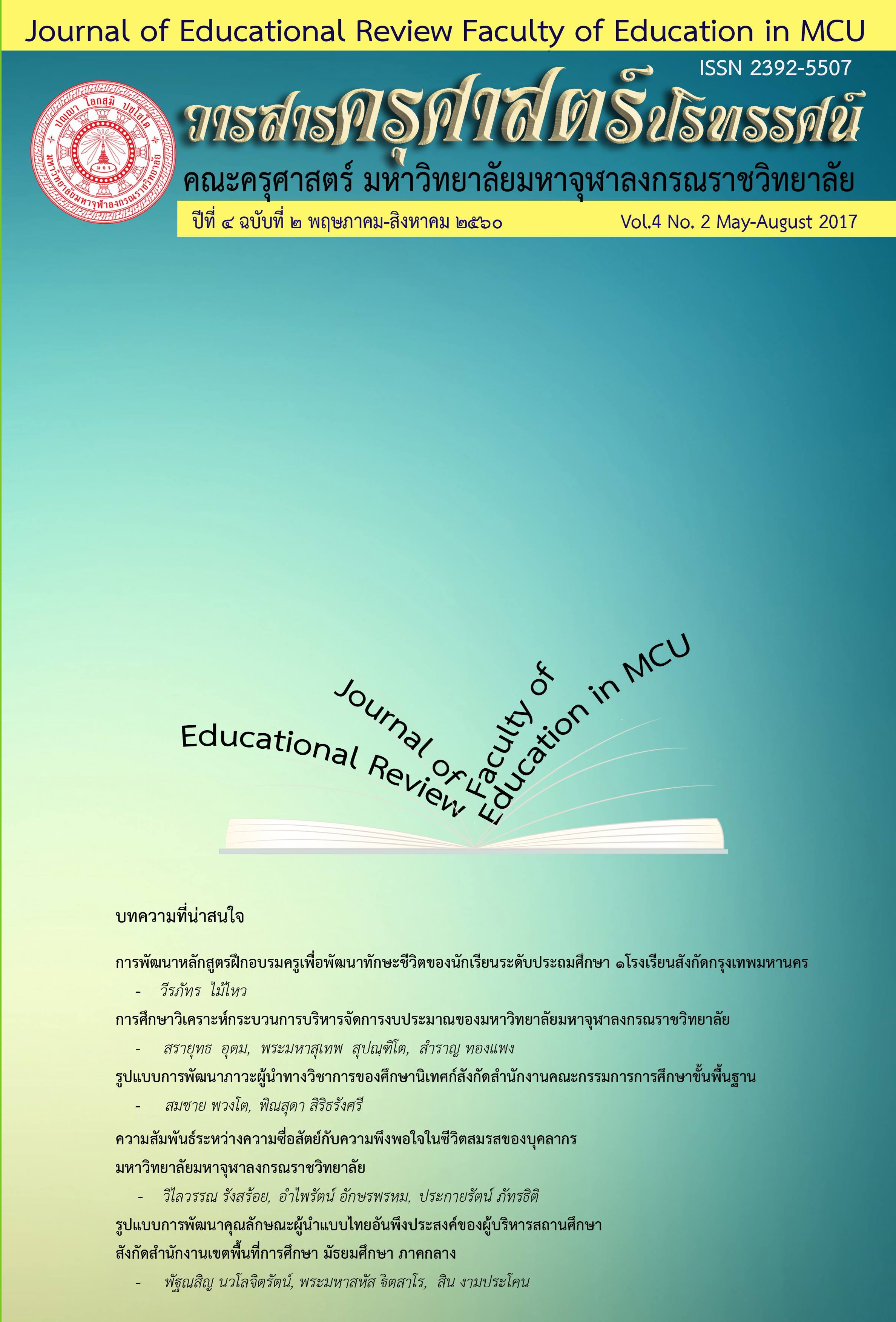Model of Equired Thai-Style Leader’Characteristics Development of Administrators Under The Office of Secondary Educational Central Middle Division
Main Article Content
Abstract
The objectives of this researcher were: Firstly, The research study aimed to study the current institutions of administrators based on the Thai leadership characteristics. Secondly, it aimed to analyze the characteristics of the leadership style of administrators under the office of secondary educational central middle division. Thirdly, to propose a model of the characteristics of the leadership style of administrators under the office of secondary educational. This research was a quantitative and qualitative used in the study. The quantitative data were collected from 160 samples through questionnaires and then analyzed by percentage, mean and standard deviation. The qualitative data were collected from focus group discussion and in-depth interview with 10 administrative monks and school administrators in total and then analyzed by content analysis.
The results of the study showed that:
- There are seven main areas of Thai-Style leadership characteristics : 1) personality, 2) skills, 3) vision 4) ability 5) relationship 6) social 7) ethical and morality areas.
Currently, the Thai-Style leadership characteristics of administrators under the office of secondary educational touched or possessed each of the above characteristics; all of the above were at a high level.
- For Buddhist doctrines and theories concerning the equired Thai-style leaders’characteristic development of Administrators it is found that the most important qualities of administrators include a good vision, talent work experience, update, good human relations, communicative skills, justice, morality, loving-kindness, honesty, sincerity, Moreover, they are required to have a good coordination, good personality, generosity, hospitality, forgiveness, and lastly they have to strictly observe the Four Noble Truths.
- For the Buddhist Approach to equired Thai-style leaders’characteristic development of Administrators it is found that 1) Conceptual skill is comprised of a visionary foresight, ability to think, plan, investigate and develop, an intelligence, resourcefulness, initiative, and a procession of new policy; 2) Technical skill of simple components includes a work capacity, expertise in the management regardless of ability and individual factors, a good criterion, flexibility, scheduled meeting, the encouragement of self-development of staff, an application of new technology, a good communicative skill and good team-work; and 3) Human relations Skill is consisted of a good human relations, personality, communicative skill, consistence, good supervision, good Coordination for organizational unity, self-confidence, loving – kindness, compassion, justice and honesty.
Article Details
ทัศนะและความคิดเห็นที่ปรากฏในบทความในวารสารฉบับนี้ถือเป็นความรับผิดชอบของผู้เขียนบทความนั้นเพียงผู้เดียว และไม่ถือเป็นทัศนะและความรับผิดชอบของกองบรรณาธิการ
กองบรรณาธิการขอสงวนสิทธิ์ในการคัดเลือกบทความลงตีพิมพ์และจะแจ้งให้เจ้าของบทความทราบหลังจากผู้ประเมินบทความตรวจอ่านบทความแล้ว
ต้นฉบับที่ได้รับการตีพิมพ์ในวารสารครุศาสตร์ปริทรรศน์ คณะครุศาสตร์ มหาวิทยาลัยมหาจุฬาลงกรณราชวิทยาลัย ถือเป็นกรรมสิทธิ์ของคณะครุศาสตร์ มหาวิทยาลัยมหาจุฬาลงกรณราชวิทยาลัย ห้ามนำข้อความทั้งหมดหรือบางส่วนไปพิมพ์ซ้ำ เว้นเสียแต่ว่าจะได้รับอนุญาตจากมหาวิทยาลัยฯ เป็นลายลักษณ์อักษร


